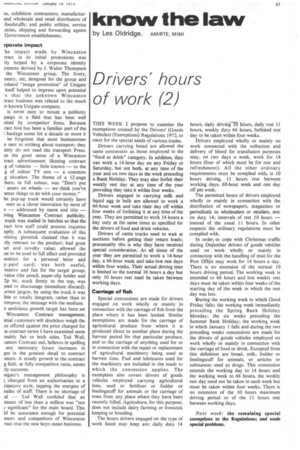know the law
Page 59

If you've noticed an error in this article please click here to report it so we can fix it.
by Les Oldridge, AMIRTE, MIMI
Drivers' hours of work (2)
THIS WEEK I propose to examine the exemptions created by the Drivers' (Goods Vehicles) (Exemptions) Regulations 1972, to cater for the special needs of various trades.
Drivers carrying bread are allowed the same concession as those employed in the "food or drink" category. In addition, they can work a 14-hour day on any Friday or Saturday, but not both, at any time of the year and on two days in the week preceding a Bank Holiday. They may also forfeit their weekly rest day at any time of the year providing they take it within four weeks.
Drivers engaged in carrying milk and liquid egg in bulk are allowed to work a 66-hour week and take their day off within four weeks of forfeiting it at any time of the year. They are permitted to work 14 hours a day only at the same times as specified for the drivers of food and drink vehicles.
Drivers of cattle trucks need to wait at auctions before getting their return loads; presumably this is why they have received special consideration. At all times of the year they are permitted to work a 14-hour day, a 66-hour week and take lost rest days within four weeks. Their actual driving time is limited to the normal 10 hours a day but only 10 hours rest need be taken between working days.
Carriage of fish Special concessions are made for drivers engaged on work wholly or mainly in connection with the carriage of fish from the place where it has been landed. Similar exemptions are made for the carriage of agricultural produce from where it is produced direct to another place during the harvest period for that particular produce, and to the carriage of anything used for or in connection with the repair or replacement of agricultural machinery being used at harvest time. Fuel and lubricants used for the machinery are included in the loads to which the concession applies. The exemption also covers drivers of goods vehicles employed carrying agricultural lime, seed or fertilizer or fodder or feedingstuff for animals or the carriage of trees from any place where they have been recently felled. Agriculture, for this purpose, does not include dairy farming or livestock keeping or breeding.
The hours drivers engaged on the type of work listed may keep are: daily duty 14 hours, daily drivinFTO hours, daily rest 11 hours, weekly duty 66 hours, forfeited rest day to be taken within four weeks.
Drivers employed wholly or mainly on work connected with the collection and delivery of blood for transfusion purposes may, on two days a week, work for 14 hours (four of which must be for rest and refreshment). All the other ordinary requirements must be complied with, ie 10 hours driving, 11 hours rest between working days, 60-hour week and one day off per week.
The permitted hours of drivers employed wholly or mainly in connection with the .
distribution of newspapers, magazines or periodicals to wholesalers or retailers, are: on duty 14; intervals of rest 10 hours — instead of the usual 11 hours. In other respects the ordinary regulations must be complied with.
In order to cope with Christmas traffic during Der/ember drivers of goods vehicles used on . work wholly or mainly in connection with the handling of mail for the Post Offi4 may work for 14 hours a day.
There is no extension of the normal 10 hours driving period. The working week is extended to 66 hours and lost weekly rest days must be taken within four weeks of the starting day of the week in which the rest day was lost.
During the working week in which Good Friday falls; the working week immediately preceding the Spring Bank Holiday Monday; the six weeks preceding the Summer Bank Holiday; the working week in which January 1 falls and during the two preceding weeks concessions are made for the drivers of goods vehicles employed on work wholly or mainly in connection with the carriage of food or drink. Excepted from this definition are bread, milk, fodder or feedingstuff for animals, or articles or substances used as drugs. This concession extends the working day to 14 hours and the working week to 66 hours, the weekly rest day need not be taken in each week but must be taken within four weeks. There is no extension of the 10 hours maximum driving period or of the 11 hours rest between working days.
Next week: the remaining special exemptions to the Regulations; and sonie special problems.




















































































































